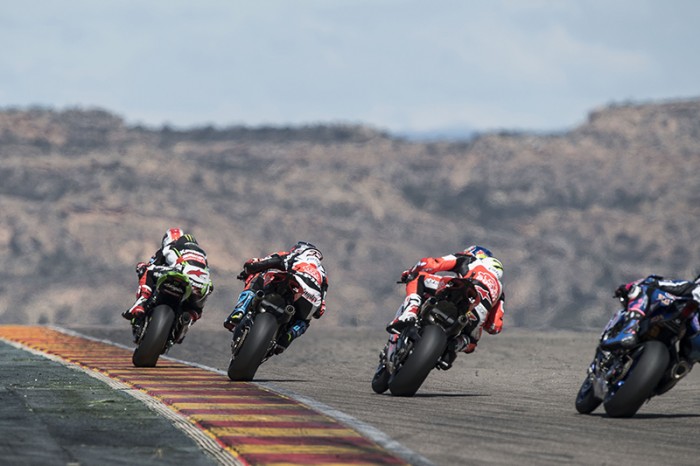When Jonathan Rea wins his third World Superbike title on the bounce, which he surely will, he will be on his way to joining Superbike Gods Bayliss, Corser and Fogarty all in the running to be called the greatest of all time. And if Kawasaki go on for another year it is highly likely he will be crowned as it would be four titles on the bounce.
Never mind that the 30-year-old Ulsterman didn't make it in MotoGP - he was never given much of a chance - he has Superbike races won by just turning up on the grid. How would you like to be leading a race with Rea up your pipe?
It seems like only the combination of Chaz Davies and Ducati can provide any sort of challenge and although nobody resents Rea's dominance, there was a palpable sense of relief when Davies won the second leg at Aragon. It was a do-or-die effort by the Welshman following a weekend of difficulties and, although 50 points behind, faint hopes of a championship, to sit alongside his Supersport title, still remain. And nobody wants a walkover.
On Saturday evening after Rea had notched up his fifth win in succession it was difficult to see any evidence that the changes, technical and otherwise, made by the promoters had made much difference to his chances. In fact, Kawasaki seem to have been quicker off the mark than their competitors and, even from the third row of a revised grid layout, Rea has the ability to carve his way to the front within a couple of laps.
It is, of course, too early to form judgements. Some of the improvements - the paddock presentations designed to make the riders more visible and available to hillmans in attendance - are to be welcomed. And more effort is being put into marketing and promotion, seeming to have caused some improvement in TV audiences and attendance. But with only 35 minutes of the second leg - the major attraction - on Sunday it can hardly be called value for money.
But at least Dorna seem to be trying harder. The efforts by series boss Danny Carrera and Dorna marketing director Manel Arroya to up the entertainment quotient is to be welcomed and they can hardly be blamed for the current British domination of the series. But, as argued ad nauseum, revolution rather than evolution is required.
‘Racing improves the breed’ has long been the justification for manufacturers spending hundreds of thousands, and in some cases millions, to put their bikes on the track and hiring top riders to get them under the linen sooner than anybody else. Well, if it was ever the case there is surely less justification for it now as highly-sophisticated computer aided design can do the job more cheaply and, arguably, better.
A more appropriate slogan might be ‘Winning improves the brand’ which is why, given today's worldwide exposure via TV and the Internet, a company like Honda regards racing as being important to them. Not particularly for the 200,000 odd bikes they sell in Europe but the four million they flog to the inhabitants of Indonesia who are quite well informed as to what is happening in MotoGP or World Superbikes.
It is also a way of creating an image which is why Ducati used to place so much importance on WSBK as a production bike series. Both companies were built on brilliant engineering but Ducati punched above its weight in marketing. Now the sheer size of the MotoGP audience is one that can't be ignored.
Kawasaki, on the other hand, has done just that. And with championships from Rea and Tom Sykes dominate the series. Perhaps it indicates that focussing on one championship or another is the way to do it. The only team likely to challenge will be Ducati with Paul Denning's Pata Yamaha team, via Messrs Lowes and Van Der Mark, giving it a good shot.
But Honda can surely already write off their chances as the much heralded launch of their new Fireblade preceded the arrival of parts to make them race winners much to the frustration of riders Nicky Hayden and Stefan Bradl - not to mention new sponsors Red Bull and Dutch team owners the uncle and nephew Ten Kate show. It is doubtful even that necessary engine updates will arrive in time for Assen.
They're not alone. The Aprilia works effort, via Shaun Muir and Milwaukee, is quick down the straights but won't stop or go round corners and so far the Italian engineers haven't been able to fix it. Eugene Laverty, another rider returning from MotoGP with big expectations, is not a happy man.
And then we have Leon Camier. No machine is slower down the straights - not much anyhow - or makes more visits to the pits than the former British champion's works MV. If the races included pit stops this would be a winning team.


